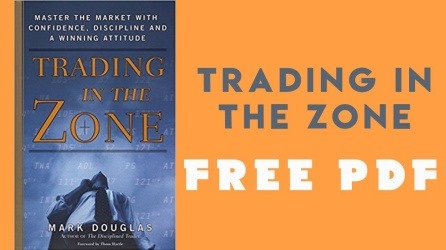READ: Trading in the Zone by Mark Douglas
TRY Those Questions:
1. To make money as a trader you have to know what the market is going co do next.
Agree Disagree
2. Sometimes I find myself thinking that there must be a way to trade without having to take a loss.
Agree Disagree
3. Making money as a trader is primarily a function of analysis.
Agree Disagree
4. Losses are an unavoidable component of trading.
Agree Disagree
5. My risk is always defined before I enter a trade.
Agree Disagree
6. In my mind there is always a cost associated with finding out what the market may do next.
Agree Disagree
7. I wouldn’t even bother putting on the next trade if I wasn’t sure that it was going to be a winner.
Agree Disagree
8. The more a trader learns about the markets and how they behave, the easier it will be for him to
execute his trades.
Agree Disagree
9. My methodology tells me exactly under what market conditions to either enter or exit a trade.
Agree Disagree
10. Even when I have a clear signal to reverse my position, I find it extremely difficult to do.
Agree Disagree
11. I have sustained periods of consistent success usually followed by some fairly drastic draw-downs
in my equity.
Agree Disagree
12. When I first started trading I would describe my trading methodology as haphazard, meaning some
success in between a lot of pain.
Agree Disagree
13. I often find myself feeling that the markets are against me personally.
Agree Disagree
14. As much as I might try to “let go,” I find it very difficult to put past emotional wounds behind me.
Agree Disagree
15. I have a money management philosophy that is founded in the principle of always taking some
money out of the market when the market makes it available.
Agree Disagree
16. A trader s job is to identify patterns in the markets’ behavior that represent an opportunity and then
to determine the risk of finding out if these patterns will play themselves out as they have in the past.
Agree Disagree
17. Sometimes I just can’t help feeling that I am a victim of the market.
Agree Disagree
18. When I trade I usually try to stay focused in one time frame. Agree Disagree
19. Trading successfully requires a degree of mental flexibility far beyond the scope of most people.
Agree Disagree
20. There are times when I can definitely feel the flow of the market; however, I often have difficulty
acting on these feelings.
Agree Disagree
21. There are many times when I am in a profitable trade and I know the move is basically over, but I
still won’t take my profits.
Agree Disagree
22. No matter how much money I make in a trade, I am rarely ever satisfied and feel that I could have
made more.
Agree Disagree
23. When I put on a trade, I feel I have a positive attitude. I anticipate all of the money I could make
from the trade in a positive way.
Agree Disagree
24. The most important component in a trader’s ability to accumulate money over time is having a
belief in his own consistency.
Agree Disagree
25. If you were granted a wish to be able to instantaneously acquire one trading skill, what skill would
you choose?
26. I often spend sleepless nights worrying about the market.
Agree Disagree
27. Do you ever feel compelled to make a trade because you are afraid that you might miss out?
Yes No
28. Although it doesn’t happen very often, I really like my trades to be perfect. When I make a perfect
call it feels so good that it makes up for all of the times that I don’t.
Agree Disagree
29. Do you ever find yourself planning trades you never execute, and executing trades you never
planned?
Yes No
30. In a few sentences explain why most traders either don’t make money or aren’t able to keep what
they make.
Mark Douglas, in Trading in the Zone, has written a book that is the accumulation of years of thought and research—the work of a lifetime—and for those of us who view trading as a profession, he has produced a gem.
This experience leads to the oft-started statistic that 95 percent of futures traders lose all of their money within the first year of trading. Stock traders generally experience the same results, which is why pundits always point to the fact that most stock traders fail to outperform a simple buy and hold investment scenario.
So, why do people, the majority of whom are extremely successful in other occupations, fail so miserably as traders? Are successful traders born and not made? Mark Douglas says no. What’s necessary, he says, is that the individual acquire the reader’s mindset. It sounds easy, but the fact is, this mindset is very foreign when compared with the way our life experiences teach us to think about the world.
That 95-percent failure rate makes sense when you consider how most of us experience life, using skills learned as we grow. When it comes to trading, however, it turns out that the skills we learn to earn high marks in school, advance our careers, and create relationships with other people, the skills we are taught that should carry us through life, turn out to be inappropriate for trading. Traders, we find out, must learn to think in terms of probabilities and to surrender all of the skills we have acquired to achieve in virtually every other aspect of our lives.
Second Must read… A killer Book by Courthey Smith…


